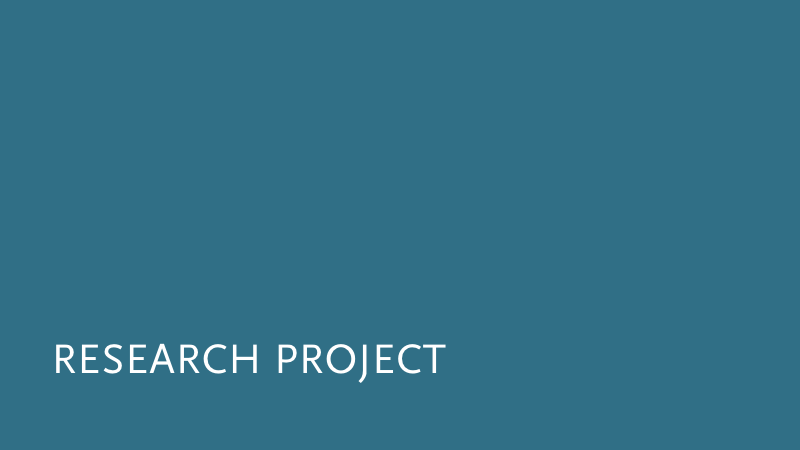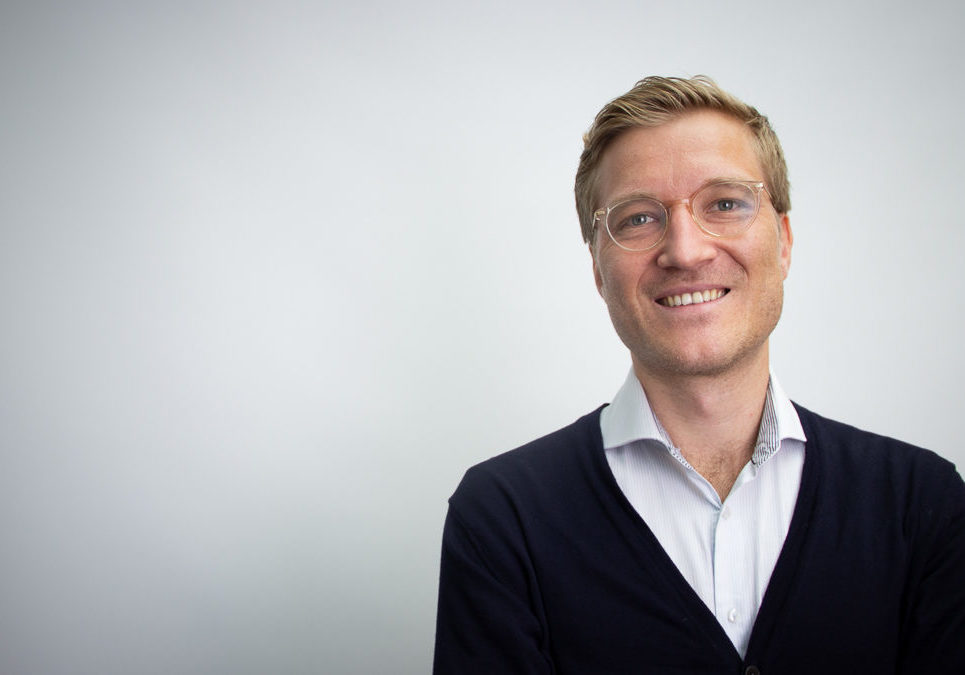Benedikt Fecher, Dr.
Since 2017, Benedikt Fecher has headed the program area “Knowledge & Society” at the Alexander von Humboldt Institute for Internet and Society (HIIG). He is an interdisciplinary science studies scholar and investigates the interrelationships between science and society in the context of digitization. His research focus is on data-driven research, research infrastructures, open science & open access, science communication, and the measurement and assessment of societal impact. He has published extensively on these topics and led national and international externally funded projects.
In 2017, Benedikt Fecher received his doctorate (summa cum laude) from the UdK Berlin, in collaboration between HIIG and DIW Berlin. In his dissertation, “A Reputation Economy: The Value of Data in Academic Research,” he focused on the provision and use of research data. Previously, he studied communication science and economics at the University of Erfurt and the University of Ottawa, as well as Culture, Communication & Globalization (focus: organizational sociology) at the University of Aalborg.
In 2017, Benedikt Fecher was scientific officer for open access and research data at the Leibniz Association. He was associated with HIIG for five years as a research associate in the lead project “Opening Science“, which received the “Outstanding Place in the Land of Ideas” award by Deutsche Bank and the German Federal Ministry of Education and Research in 2016. In 2016, he was also a DARIAH-DE Fellow at the Max Planck Institute for the History of Science. He is a Research Fellow German Institute for Economic Research (DIW Berlin).
Initiatives:
Selected memberships:
- Member of the working group “Implications of digitization for the quality of science communication“ of the Berlin-Brandenburg Academy of Sciences and Humanities
- Spokesperson for the research field of science communication at the #FactoryWisskomm of the Federal Ministry of Education and Research
- Member of the Advisory Board of the ERC project “A Philosophy of Open Science for Diverse Research Environments“.
- Member of the Advisory Board of the InnOsci project of the Stifterverband and the Federal Ministry of Education and Research
- Member of the Editorial Board of the open access journal “Publications“.
Videos
 Science & education · Science engagement
Science & education · Science engagementCapacities and competencies in dealing with hate speech and hostility towards science
This project develops strategies to make the science system more resilient to high publicity negative statements.
 Science & education
Science & educationOrganisational Adaptivity in the German Higher Education Context
In this project, we investigate the digitalisation of higher education, with a focus placed on exploring the implementation of teaching and learning innovations. Science & education · Society & culture
Science & education · Society & cultureIMPaQT – Indicators, Measurement and Performance of Quality Assurance: Third-Mission-Activities in the Social Sciences
The research project “IMPaQT” is about making knowledge transfer from research to society measurable through quality criteria and indicators. Science & education · Science engagement
Science & education · Science engagementACTiSS: Action for computational social science
This educational project aims at fostering the development of computational thinking among social science students and young professionals. All digital training and teaching materials... Science & education · Society & culture
Science & education · Society & cultureDREAM (Digital Research Mining)
As part of the DREAM project, a mobile application is being developed that simplifies the search for scientific open access publications and suggests suitable... Politics & law · Society & culture
Politics & law · Society & cultureWahlkompass Digitales
Click here for Wahlkompass 2021 Digital policy will be a focal point of the German federal elections in 2017. More than ever, the elections... Science & education · Society & culture
Science & education · Society & cultureOpening Science
It seems as though the digitalisation of research is accompanied by a revision of established research practices and an opening of the research process....
Books
Blümel C., Fecher B., & Leimüller G. (2019). Was gewinnen wir durch Open Science und Open Innovation? Essen: Edition Stifterverband Verwaltungsgesellschaft für Wissenschaftspflege mbH. Publication details
Fecher, B. (2018). Eine Reputationsökonomie. Der Wert der Daten in der akademischen Forschung. Wiesbaden, Hessen: Springer VS. Publication details
Journal articles and conference proceedings
Fecher, B., Kunz, R., Sokolovska, N., & Wrzesinski, M. (2024). Platformisation of Science Conceptual Foundations and Critical Perspectives for the Science System. LIBER Quarterly: The Journal of the Association of European Research Libraries, 34(1). DOI: 10.53377/lq.16693 Publication details
Sokolovska, N., Ellersiek, A., & Fecher, B. (2024). Scientific policy advice on sustainable development: lessons learned from the Dialogue between Scientific Councils in Germany. Journal of Environmental Studies and Sciences. DOI: 10.1007/s13412-024-00972-8 Publication details
Fecher, B., Hebing, M., Laufer, M., Pohle, J., Sofsky, F. (2023). Friend or foe? Exploring the implications of large language models on the science system. AI & Society, 38. DOI: 10.1007/s00146-023-01791-1 Publication details
Fecher, B., Hebing, M., Laufer, M., Pohle, J., & Sofsky, F. (2023). Friend or foe? Exploring the implications of large language models on the science system. AI & Soc. DOI: 10.1007/s00146-023-01791-1 Publication details
Fecher, B., Kuper, F., Fähnrich, B., Schmid-Petri, H., Schildhauer, T., Weingart, P., & Wormer, H. (2022). Balancing interests between freedom and censorship: Organizational strategies for quality assurance in science communication. Science and Public Policy, scac043, 1-14. DOI: 10.1093/scipol/scac043 Publication details
Benedikt Fecher (2022). Welche Denkfehler die gesellschaftliche Relevanz von Forschung in Deutschland hemmen. Transfer & Innovation. Publication details
Fecher, B., & Hebing, M. (2021). How do researchers approach societal impact? PLoS ONE. DOI: 10.1371/journal.pone.0254006 Publication details
Blättel-Mink, B., Bogner, A., Fecher, B., Griem, J., Rinsdorf, L., & Villa Braslavsky, P.-I. (2021). Wissenschaftskommunikation in den Gesellschaftswissenschaften. SOZIOLOGIE, 50(1). Publication details
Fecher,B., Kuper, F., Sokolovska, N., Fenton, A., Hornbostel, S., & Wagner, G.G. (2021). Understanding the Societal Impact of the Social Sciences and Humanities: Remarks on Roles, Challenges, and Expectations. Frontiers in Research Metrics and Analytics, 6. DOI: 10.3389/frma.2021.696804 Publication details
Laufer, M., Leiser, A., Deacon, B., Perrin de Brichambaut, P., Fecher, B., Kobsoda, C., & Hesse, F. (2021). Digital higher education: A divider or bridge builder? Leadership perspectives on EdTech in a COVID-19 reality. International Journal of Educational Technology in Higher Education, 18(51). DOI: https://doi.org/10.1186/s41239‐021‐00287‐6 Publication details
Fecher, B., Khan, R., Sokolovska, N., Völker, T., & Nebe, P. (2021). Making a Research Infrastructure: Conditions and Strategies to Transform a Service into an Infrastructure. Science And Public Policy, 48(4), 499–507. DOI: 10.1093/scipol/scab026 Publication details
Elsholz, U., Fecher, B., Deacon, B., Schäfer, L.O., & Laufer, M. (2021). Implikationen der Covid-19-Pandemie für digitale Lehre: Organisierte Freiheit als Veränderungsparadigma. MedienPädagogik: Zeitschrift für Theorie Und Praxis Der Medienbildung, 40(CoViD-19), 472-86. DOI: 10.21240/mpaed/40/2021.11.29.X Publication details
Fecher, B. & Kobsda, C. (2019). Meet the Research Impact Canvas. Elephant in the Lab. DOI: 10.5281/zenodo.3368480 Publication details
Sokolovska N., Fecher B., Wagner G. (2019). Communication on the Science-Policy Interface: An Overview of Conceptual Models. Publications(Third Mission and Societal Impact). DOI: 10.3390/publications7040064 Publication details
Friesike, S., Fecher, B., & Wagner, G.G. (2018). Teach young scientists the importance of societal impact for research. Nature - International journal of science. DOI: 10.1038/d41586-018-02066-2 Publication details
Mueller-Langer, F., Fecher, B., Harhoff, D., Wagner, G.G. (2018). Replication studies in economics—How many and which papers are chosen for replication, and why? Research Policy, 48(1), 62-83. DOI: 10.1016/j.respol.2018.07.019 Publication details
Fecher, B., Fräßdorf, M., Hebing, M., & Wagner, G. G. (2017). Replikationen, Reputation und gute wissenschaftliche Praxis. Information - Wissenschaft & Praxis, 68(3). Publication details
Fecher, B., Friesike, S., Hebing, M., & Linek, S. (2017). A reputation economy: how individual reward considerations trump systemic arguments for open access to data. Palgrave Communications, 3. Publication details
Linek, S. B., Fecher, B., Friesike, S., & Hebing, M. (2017). Data sharing as social dilemma: Influence of the researcher’s personality. PLoS ONE, 12(8). Publication details
Fecher, B. & Wagner, G. (2016). A research symbiont. Science, 351(6280), 1405-1406. Publication details
Fecher, B. & Wagner, G. (2016). Open Access, Innovation, and Research Infrastructure. Publications, 4(2). Publication details
Fecher, B. (2016). “Mehr Licht” Offenheit muss sich lohnen. Laborjournal Online. Publication details
Scheliga, K., Friesike, S., Puschmann, C., & Fecher, B. (2016). Setting up crowd science projects. Public Understanding of Science, 1-20. Publication details
Fecher, B., Friesike, S., & Hebing, M. (2015). What Drives Academic Data Sharing? PLOS ONE, 10(2). Publication details
Fecher, B. & Puschmann, C. (2015). Über die Grenzen der Offenheit in der Wissenschaft – Anspruch und Wirklichkeit bei der Bereitstellung und Nachnutzung von Forschungsdaten. Information - Wissenschaft & Praxis, 66(2-3), 146–150. Publication details
Fecher, B. & Friesike, S. (2014). Sharing Data in Academia. International Conference on Infrastructures and Cooperation in e-Science and e-Humanities. Publication details
Fecher, B. & Friesike, S. (2013). Open Science: One Term, Five Schools of Thought. RatSWD Working Paper Series. Publication details
Edited works
Ajji, K., Schafer, B., Weis, R. T., Bartlett, R., Musdliar, P., Peterson, G., Dallastar, V., Baecker, D., Beauxis-Aussalet, E., Graham, M., Hermann, I., Bessant, C., Sgueo, G. (2020). twentyforty – Utopias for a Digital Society. In Benedikt Fecher (Ed.), Berlin: Alexander von Humboldt Institute for Internet and Society. DOI: 10.5281/zenodo.3677187 Publication details
Book contributions and chapters
Fecher, B. (2023). Kommunikative Offenheit als formativer Bewertungsansatz für den gesellschaftlichen Impact von Forschung. In J. Blank, C. Bergmüller, & S. Sälzle, Transformationsanspruch in Forschung und Bildung Konzepte, Projekte, empirische Perspektiven (pp. 69-81). Münster: Waxmann. DOI: 10.31244/9783830996774 Publication details
Fecher, B., Deacon, B., Ingen-Housz, T., Sokolovska, N. (Eds.) (2020). An Unlikely Experiment., Twentyfourty - Utopias for the Digital Society (pp. 9-15) Berlin: Humboldt Institute for Internet and Society. DOI: 10.5281/zenodo.3678207 Publication details
Fecher, B., Sokolovska, N., Friesike, S., Wagner, G. (2019). Governance von Forschungsinfrastruktur am Beispiel von Open Access. In W. Bredemeier (Ed.), Informationswissenschaft. Hat die Informationswissenschaft eine Zukunft? (pp. 430-443). Berlin: Simon Verlag für Bibliothekswissen. Publication details
Friesike, S., & Fecher, B. (2019). Crowd Science: Forschung im digitalen Zeitalter. In Gassmann, O., & Sutter, P. (Eds.), Digitale Transformation im Unternehmen gestalten: Geschäftsmodelle Erfolgsfaktoren Fallstudien Handlungsanweisungen. München: Carl Hanser Verlag. Publication details
Friesike, S. & Fecher, B. (2016). Crowd Science: Forschung im digitalen Zeitalter. In Gassmann, O. & Sutter, P. (Eds.), Digitale Transformation im Unternehmen gestalten: Geschäftsmodelle Erfolgsfaktoren Fallstudien Handlungsanweisungen (pp. 135-146). München: Carl Hanser Verlag. Publication details
Friesike, S. & Fecher, B. (2016). Collaboration, participation and transparency: the promise of digitizing academic research. In Olleros, F. X. & Zhegu, M. (Eds.), Research Handbook on Digital Transformations (pp. 121-134). Cheltenham (UK) / Northampton (US): Edward Elgar Publishing Limited. Publication details
Fecher, B., Stumpp, S. (2014). Themenrecherche, Aufbereitung und Vermarktung – Wie kann Open Journalism funktionieren? In Taube, M., Woznicki, K., Komplizen - Wie können Hacker und Journalisten, Piraten und Kapitalisten, Amateure und Profis zusammenarbeiten?. Germany: iRights Media. Publication details
Fecher, B. & Friesike, S. (2013). Open Science: One Term, Five Schools of Thought. In Bartling, S. & Friesike (Eds.), Opening Science (pp. 17-47). Cham: Springer. DOI: 10.1007/978-3-319-00026-8_2 Publication details
Benedikt, F., & Friesike, S. (2013). Open Science: One Term, Five Schools of Thought., Opening Science (pp. 17-47) Cham: Springer. DOI: 10.1007/978-3-319-00026-8_2 Publication details
Working paper
Fecher, B. & Hebing, M. (2021). How do researchers achieve societal impact? Results of an empirical survey among researchers in Germany. SSOAR. DOI: 10.1371/journal.pone.0254006 Publication details
Neuberger, C., Weingart, P., Fähnrich, B., Fecher, B., Schäfer, M., Schmid-Petri, H., & Wagner, G. G. (2021). Der digitale Wandel der Wissenschaftskommunikation. Berlin-Brandenburgische Akademie der Wissenschaften (BBAW). Publication details
Fecher, B., Sokolovska, N., Völker, T., Nebe, P., Kahn, R. (2020). Making a Research Infrastructure: Conditions and Strategies to Transform a Service into an Infrastructure. SSOAR. Publication details
Wagner, G. G., Mueller-Langer, F., Harhoff, D., & Fecher B. (2017). The Economics of Replication. Max Planck Institute for Innovation & Competition Research Paper No. 17-03. Publication details
Schmidt, M., Fecher, B., & Kobsda, C. (2017). Factory science: How many authors does it really need to write a paper? Elephant in the lab. Publication details
Fecher, B., Fräßdorf, M., & Wagner, G. (2016). Perceptions and Practices of Replication by Social and Behavioral Scientists: Making Replications a Mandatory Element of Curricula Would Be Useful. DIW Berlin Diskussionspapier, 1572. Publication details
Fecher, B. & Wagner, G. (2016). Flipping Journals to Open: Rethinking Publishing Infrastructure. DIW Berlin Diskussionspapier, 1533. Publication details
Fecher, B., Friesike, S., Hebing, M., Linek, S., & Sauermann, A. (2015). A Reputation Economy: Results from an Empirical Survey on Academic Data Sharing. DIW Berlin Discussion Paper, No. 1454. Publication details
Fecher, B. & Wagner, G. (2015). Flipping journals to open: Rethinking publishing infrastructure. The RatSWD Working Paper Series. Publication details
Fecher, B., Friesike, S., & Hebing, M. (2014). What drives academic data sharing? Working Paper Series des Rates für Sozial- und Wirtschaftsdaten, No. 236. Publication details
Fecher, B., Friesike S. & Hebing, M. (2014). What drives academic data sharing? SOEPpapers, 655. Publication details
Other publications
Fecher, B., Gümüsay, A. A., Bohn, S. & A. Jobin (2023). Resilience without accountability holds back transformative change. LSE Impact Blog. Publication details
Fecher, B., Gümüşay, A. A., Bohn, S., & Jobin, A. (2023). Resilience without accountability holds back transformative change. LSE Impact Blog. Publication details
Fecher, B., Hebing, M., Laufer, M., Pohle, J., Sofsky, F. (2023). Friend or Foe? Exploring the Implications of Large Language Models on the Science System. Humboldt Institute for Internet and Society. Publication details
Fecher, B. (2022). Open infrastructure needs a level playing field. Research Professional News. Publication details
Fecher, B., Sokolovska, N., Kuper, F., & Fenton, A. (2021). Impact der Gesellschaftswissenschaften – (Wie) Kann man ihn messen? Wissenschaftskommunikation.de. Publication details
Bromme, R., Fähnrich, B., Fecher, B., & Loth, A. (2021). Nicht nur mehr, sondern besser. Warum Forschung zur Wissenschaftskommunikation für Gesellschaft und Wissenschaft wichtig ist. DUZ-Magazin. Publication details
Fecher, B., Sokolovska, N., Kuper, F., & Fenton, A. (2021). Impact of social sciences – (How) Can it be measured? Elephant in the Lab. Publication details
Fecher, B., & Deacon, B. (2021). Turning Scientists Into Novelists. encore. The Annual Magazine on Internet and Society Research. Publication details
Schmidt, M., Fecher, B., Kobsda, C. & Koch, E. (2020). Open Access in Near Time. Elephant in the Lab, 01.04.2020. Publication details
Fecher, B., & Deacon, B. (2020). Leben, lieben, lernen – im Jahr 2040. Digital Society Blog. Publication details
Fecher, B., Sokolovska, N., & Hebing, M. (2019). Teaching Impact is Key to Make Science Socially Relevant. Generation R. Publication details
Fecher, B., Wagner, G. W. & Friesike, S. (2019). Bedeutung ist keine Klickzahl. Frankfurter Allgemeine Zeitung, 17.07.2019. Publication details
Fecher, B. & Kobsda, C. (2019). In 5 Schritten zur gut geplanten Kommunikationsaktivität. Wissenschaftskommunikation.de. Publication details
Fecher, B., Leimüller G., & Blümel, C. (2018). Das Potenzial strategischer Öffnung. Zukunft des deutschen Wissenschafts- und Innovationssystems. Stifterverband. Publication details
Fecher, B., & Sokolovska, N. (2018). Medien, Politik, Wirtschaft – wer profitiert von eurer Forschung? wissenschaftskommunikation.de. Publication details
Friesike, S., Fecher, B. & Wagner, G. (2018). It’s time to update our understanding of scientific impact. Elephant in the Lab. Publication details
Fecher, B., Friesike, S., Peters, I., & Wagner, G. (2017). Rather than simply moving from “paying to read” to “paying to publish”, it’s time for a European Open Access Platform. LSE Impact Blog. Publication details
Kobsda, C., Schmidt, M., & Fecher, B. (2017). Authorship revised. Making a compromise between 2.1 and 1.268. Elephant in the lab. Publication details
Fecher, B. & Bartling, S. (2016). Could Blockchain provide the technical fix to solve science’s reproducibility crisis? LSE Impact of Social Sciences blog. Publication details
Fecher, B. & Bartling, S. (2016). Wie Blockchain die Wissenschaft verbessern könnte. iRights Blog. Publication details
Fecher, B., Schulz, W., Preiß, K., & Schildhauer, T. (2016). Schlüsselressource Wissen: Lernen in einer digitalisierten Welt. Studie des Alexander von Humboldt Institut für Internet und Gesellschaft im Auftrag des Bundesverband der deutschen Industrie (BDI) und der Internet Economy Foundation (IE.F). Publication details
Fecher, B. & Kaiser, J. (2015). Collapsing Ivory Towers? A hyperlink analysis of the German academic blogosphere. The Impact Blog. Publication details
Fecher, B., Frisike S., Hebing, M., Linek S., & Sauermann A. (2015). Academia is a reputation economy — data-sharing policies should take incentives into account. The Impact Blog. Publication details
Fecher, B., Frisike S., Hebing, M., & Linek S. (2015). Reputation instead of obligation: forging new policies to motivate academic data sharing. The Impact Blog. Publication details
Fecher, B. & Wagner, G. (2015). Flipping journals to open: Rethinking publishing infrastructure in light of Lingua/Glossa case. The Impact Blog. Publication details
Fecher, B. (2014). The great potential of citizen science: restoring the role of tacit knowledge and amateur discovery. The Impact Blog. Publication details
Fecher, B. (2014). Academic publishing can free itself from its outdated path dependence by looking to alternative review mechanisms. The Impact Blog. Publication details
Fecher, B. & Friesike, S. (2013). Open Science: digging deeper into the assumptions that underpin openness and Web 2.0. The Impact Blog. Publication details
Fecher, B. (2013). Themenrecherche, Aufbereitung und Vermarktung: Wie kann Open Journalism funktionieren? Berliner Gazette - Kultur, Politik und Digitales. Publication details
Lectures and presentations
Gesellschaftliche Relevanz von Forschung: kritische Impulse zur Messung, Bewertung und SteuerungTreffen des Arbeitskreises Wissenschaft und Forschung: Wie messe ich den Erfolg meiner wissenschaftsfördernden Arbeit?. Arbeitskreis Wissenschaft und Forschung. Joachim Herz Stiftung, Hamburg, Germany: 28.04.2023 Further information
Benedikt Fecher
Ergebnisse aus dem BMBF-Forschungsprojekt: IMPaQT: "Indikatoren, Messung und Performanz der Qualitätssicherung: Third-Mission-Tätigkeiten in den GesellschaftswissenschaftenWissenschaftspolitischer Gesprächskreis. Leibniz Forschungszentrum Wissenschaft und Gesellschaft. Leibniz Forschungszentrum Wissenschaft und Gesellschaft, Hannover, Germany: 03.02.2023
Benedikt Fecher
Wissenschaftskommunikation in Universitäten und Forschungseinrichtungen: Chancen und Risiken der DigitalisierungAbschlussveranstaltung der Arbeitsgruppe "Implikationen der Digitalisierung für die Qualität der Wissenschaftskommunikation". Berlin-Brandenburgische Akademie der Wissenschaften. bbaw, Berlin, Germany: 27.09.2022
Benedikt Fecher, Thomas Schildhauer
What problems can open science solve?Digital Genres and Open Science International Conference. University of Zaragoza. Online, Zaragoza, Spain: 27.05.2022 Further information
Benedikt Fecher
How to decide on the right kind of opennessLIBER Journées 2022 for Library Directors in Budapest. Library and Information Centre Hungarian Academy, Budapest, Hungary: 19.05.2022 Further information
Benedikt Fecher
A theoretical perspective on openness and digital science communicationSTS Conference Graz 2022. TU Graz. Das Weitzer, Graz, Switzerland: 03.05.2022 Further information
Benedikt Fecher
Open Science – an answer to complex problems?Open Science – an answer to complex problems? (Session: Open Science – an answer to complex problems?). Leibniz-Institute of Freshwater Ecology and Inland Fisheries (IGB). Online, Berlin, Germany: 26.11.2020 Further information
Benedikt Fecher
Impulse für einen Open Data Impact AwardINNOSCI IDEA SPRINT - MAKE OPEN DATA COUNT!. Stifterverband. Allianz Forum, Berlin, Germany: 05.11.2019 Further information
Benedikt Fecher
Impulse für eine bessere ForschungBMBF-Forum International „The Future of Work“. Bundesministerium für Bildung und Forschung, Berlin, Germany: 22.05.2019 Further information
Benedikt Fecher
The Dark Side of the Moon: Blind spots in the Assessment of RelevanceTechnoscientific Constitutionalism. DFG-NSF. ASU Barret and O'Connor Washington Center, Washington D.C., USA: 07.02.2019
Benedikt Fecher
Knowledge Transfer: Connecting with your audienceAI: Legal & Ethical Implications (Session: Knowledge Transfer: Connecting with your audience). The Center for Cyber Law & Policy. University of Haifa (CCLP), Haifa, Israel: 28.11.2018 Further information
Benedikt Fecher
Open Access und die Governance von ForschungsinfrastrukturOpen Access Week 2018. Thüringer Ministerium für Wirtschaft, Wissenschaft und Digitale Gesellschaft (TMWWDG). Bauhaus-Universität, Weimar, Germany: 24.10.2018 Further information
Benedikt Fecher
Open access is gaining ground – it's time to talk about the infrastructureFORCE2018. McGill University, Montréal, Canada: 12.10.2018 Further information
Benedikt Fecher
Offene Wissenschaft in der Soziologie: Was können wir? Wohin wollen wir?DGS Kongress 2018. Deutsche Gesellschaft für Soziologie. Universität Göttingen, Göttingen, Germany: 27.09.2018 Further information
Benedikt Fecher
Open Access: Eine Frage der Infrastruktur16. KOBV-Forum 2018: Von Openness, Schranken und Veränderungen. KOBV-Zentrale. Takustraße 7, Berlin, Germany: 27.06.2018
Benedikt Fecher
Berliner Bibliothekswissenschaftliches Kolloquium. Institut für Bibliotheks- und Informationswissenschaften, Berlin, Germany: 24.06.2018Dr. Benedikt Fecher
Mapping the way to a public open access infrastructureFORCE11 – The Future of Research Communication and e-Scholarship. Force11, Berlin, Germany: 26.10.2017
Benedikt Fecher, Tony Ross-Hellauer
Open Science in PracticeOpen Science Evening Talks. Rolex Learning Center, Lausanne, Switzerland: 25.09.2017
Benedikt Fecher
The path-dependence of academic value creation: Impact, infrastructure, and innovation in academic publishingOpen Science Fair. Greek National Library, Athens, Greece: 06.09.2017
Benedikt Fecher
Altmetrics: Trends in Research and ways to meet themInternational Open Science Conference 2017. Leibniz Research Alliance Science 2.0. NH Collection, Berlin, Germany: 21.03.2017
Benedikt Fecher
Publishing and the Limits of OpennessPhilosophy and History of Open Science #PHOS16 (Session: Session 5: Academic communities). HELDIG: Helsinki Centre for Digital Humanities. University of Helsinki, Helsinki, Finnland: 01.12.2016
Benedikt Fecher
Data Management in den WirtschaftswissenschaftenVfS-Jahrestagung 2016: "Demographischer Wandel". Verein für Socialpolitik. Universität Augsburg, Augsburg, Germany: 04.09.2016
Benedikt Fecher
Eine Geschichte des wissenschaftlichen PublizierensLange Nacht der Wissenschaften (Session: Wissenschaft im Kurzformat). Alexander von Humboldt Institute for Internet and Society. HIIG, Berlin, Germany: 11.06.2016
Benedikt Fecher
Perspectives on Academic Data SharingICONECSS (Session: Science 2.0 and Open Science Practices). ZBW – Leibniz Information Centre for Economics. Schleswig-Holstein Representative Office to the Federal Government, Berlin, Germany: 20.04.2016
Benedikt Fecher
Bereitstellung und Nachnutzung von Forschungsdaten in den Geisteswissenschaften: Potentiale der Sekundärnutzung in den Geistes- und KulturwissenschaftenFORGE Konferenz 2015. Universität Hamburg. Universität Hamburg, Hamburg, Germany: 17.09.2015
Benedikt Fecher
Chancen und Grenzen des Offenen Zugangs zu ForschungsdatenVfS-Jahrestagung 2015 (Session: Ökonomische Entwicklung - Theorie und Politik). Verein für Sozialpolitik. University of Muenster, Muenster, Germany: 06.09.2015
Benedikt Fecher
Die digitale GesellschaftMediale Welten: Wissen, Information und Kommunikation im digitalen Umbruch (Session: Mediale Welten: Wissen, Information und Kommunikation im digitalen Umbruch). Akademienunion. Berlin-Brandenburgischen Akademie der Wissenschaften, Berlin, Germany: 01.09.2015
Benedikt Fecher
Data Availability and Reuse – Results of An Empirical Study Among German ResearchersThe 6th Conference of the European Survey Research Association (ESRA). The organizing committee - Bart Meuleman, Annelies Blom, Eldad Davidov, Gudbjorg Andrea Jonsdottir, Nick Allum, Patrick Sturgis. University of Iceland, Reykjavik, Iceland: 13.07.2015
Benedikt Fecher, Marcel Hebing, Sascha Frisike
Empirical Results on Academic Data SharingInternational Conference on Science 2.0. Leibniz Forschungsverbund Science 2.0, Hamburg, Germany: 26.03.2015
Benedikt Fecher
Pfadabhängigkeiten des wissenschaftlichen PublizierensJahresversammlung des Verbands Bibliotheken des Landes Nordrhein-Westfalen e.V.. vbnw. Stadtbüchereien Hamm - Zentralbibliothek, Hamm Westfalen, Germany: 11.12.2014
Benedikt Fecher
Basics for Conducting a Systematic Literature ReviewBasics for Conducting a Systematic Literature Review. German Institute for Economic Research. DIW Berlin, Berlin, Germany: 10.12.2014
Invited researcher
Leibniz Science 2.0. Sharing Research Data in Academia. First Survey Results.Research Data Alliance Europe. RDA Europe. Helmholtz-Zentrum Potsdam Deutsches GeoForschungsZentrum, Potsdam, Germany: 21.11.2014
Benedikt Fecher
Umgang mit und Nachnutzung von ForschungsdatenSowiDataNet. Deutsches Institut für Wirtschaftsforschung, Berlin, Deutschland: 23.06.2014
Benedikt Fecher
Panels
Inklusive Wissenschaft: zum Für und Wider von Open Science und Citizen ScienceUniversitätsdiskurs Austria 2018: Wissenschaft | Kunst | Gesellschaft im Gespräch. Österreichische Universitätenkonferenz (uniko). TU Wien, Vienna, Austria: 11.09.2018 Further information
Benedikt Fecher
Moderation of workshops and panels
Open data and infrastructure sharingOIS Research Conference 2022. Ludwig Boltzmann Gesellschaft, Open innovation in Science Centre. online/ CERN IdeaSquare, Genf, Switzerland: 13.05.2022 Further information
Benedikt Fecher
Organisation of events
Digitaler Salon: Chatbot potentia est!22.02.2023. Humboldt Institut für Internet und Gesellschaft, Berlin, Germany (National) Further information
Daniel Pothmann, Sarah Spitz, Martin Schmidt, Benedikt Fecher
Digitaler Salon: Expertise in der Krise27.04.2022. Humboldt Institut für Internet und Gesellschaft, Online, Berlin, Germany (National) Further information
Sarah Spitz, Benedikt Fecher
What Has The Pandemic Taught Us About “OPEN SCIENCE”?Berlin Science Week 2021. with attending Vip: Ulrich Dirnagl, Stephanie Dawson, Diana Kwon, Rebecca Winkels. From 01.11.2021 to 01.12.2021. Humboldt Institut für Internet und Gesellschaft, Berlin, Germany. Co-Organised by: ScienceOpen, ELEPHANT IN THE LAB (International) Further information
Benedikt Fecher
Organisation der Qualitätssicherung von WissenschaftskommunikationFrom 26.06.2021 to 26.06.2021. BBAW, Berlin, Germany. Co-Organised by: BBAW (National)
Benedikt Fecher
Open Science – an answer to complex problems?Open Science Week 2020. From 26.11.2020 to 26.11.2020. Humboldt Institut für Internet und Gesellschaft, Berlin, Germany. Co-Organised by: IGB (International) Further information
Benedikt Fecher
twentyforty talks – Auf einen Drink mit Burkhard Schafer19.05.2020. Livestream, Berlin, Germany (International) Further information
Benedikt Fecher
twentyforty talks - Auf einen Drink mit Dirk Baeckerwith attending Vip: Dirk Baecker. 15.04.2020. Stream, Berlin, Germany (National) Further information
Bronwen Deacon, Benedikt Fecher
Translating Science: What’s good and what’s not?with attending Vip: Dr. Gregor Hagedorn, Prof. Gert G. Wagner, Elena Erdmann. 01.10.2019. Humboldt Institute for Internet and Society, Berlin, Germany. Co-Organised by: Elephant in the lab (International) Further information
Teresa Völker, Benedikt Fecher
Impact School 201930.09.2019. Humboldt Institute for Internet and Society, Berlin, Germany. Co-Organised by: Impact Distillery (mStats DS GmbH), Leibniz Research Alliance Open (International) Further information
Nataliia Sokolovska, Marcel Hebing, Benedikt Fecher
Impact School 2018: Science Transfer in the 21st CenturyFrom 17.09.2018 to 19.09.2018. Humboldt Institut für Internet und Gesellschaft, Berlin, Germany (International) Further information
Benedikt Fecher
Finding the essence. Businesses facilitating knowledge transferFrom 17.09.2018 to 17.09.2018. Humboldt Institut für Internet und Gesellschaft, Berlin, Germany (International) Further information
Benedikt Fecher
The future of Open Access in GermanyFrom 13.08.2018 to 13.08.2018. Humboldt Institut für Internet und Gesellschaft, Berlin, Germany (International) Further information
Benedikt Fecher
Understanding the impact of scienceFrom 11.06.2018 to 11.06.2018. Humboldt Institut für Internet und Gesellschaft, Berlin, Germany (National) Further information
Benedikt Fecher
Das Ende der Transparenz?Lange Nacht der Wissenschaften 2018. 09.06.2018. Humboldt Institut für Internet und Gesellschaft, Berlin, Germany. Co-Organised by: Lange Nacht der Wissenschaften Berlin + Potsdam (National) Further information
Alexandra Giannopoulou, Tuukka Lehtiniemi, Nataliia Sokolovska, Lisa Gutermuth, Christian Djeffal, Shirley Ogolla, Sönke Bartling, Matti Grosse, Wolfgang Schulz, Kirsten Gollatz, Christian Katzenbach, Benedikt Fecher
Impact School 2017From 29.11.2017 to 01.12.2017. Humboldt Institut für Internet und Gesellschaft, Berlin, Germany. Co-Organised by: Marcel Hebing (International) Further information
Marcel Hebing, Benedikt Fecher
Nominations
WikiMedia Germany: Mentor in the Open Science Fellows Program.Benedikt Fecher
Participation as expert
Innovative research infrastructuresOpen research: rethinking scientific collaboration Vortrag zu innovativen Forschungsinfrastrukturen bei der Konferenz "Open Research: rethinking scientific collaboration" Perimeter Institute for Theoretical Physics. Perimeter Institute for Theoretical Physics, Waterloo, Canada: 28.03.2018
Dr. Benedikt Fecher
Media appearances
Internet und Gesellschaft: Was weiß der Chatbot? (16.08.2024). Tagesspiegel
Wissenschaftsfeindlichkeit: Die Stimme der Wissenschaft darf nicht verstummen (19.07.2023). Zeit online
Further information
Forschende sollen KI nutzen: Verantwortungsbewusstes und kritisches Handeln gefordert (11.07.2023). Tagesspiegel
Further information
Auswirkungen der KI auf die Forschung (26.06.2023). DIE ZEIT Wissen³
Further information
Künstliche Intelligenz im Forschungsalltag: Mehr Zeit für die eigentliche Wissenschaft (27.06.2023). Tagesspiegel
Further information
Große Experten-Umfrage. ChatGPT: Warum der Nutzen überwiegt (20.06.2023). zm online
Further information
Studie zu KI. Sprachmodelle helfen der Wissenschaft (20.06.2023). elektroniknet.de
Further information
ChatGPT: Die Verantwortung der Wissenschaft (20.06.2023). bildungsklick
Further information
ChatGPT: Sind Maschinen die besseren Forscher? (15.02.2023). Tagesspiegel
Further information
FOS 24 Relevanz der Wissenschaft für die Gesellschaft (28.11.2022). The Future is Open Science Podcast
Further information
Impact der Gesellschaftswissenschaften – (Wie) Kann man ihn messen? (02.06.2021). wissenschaftskommunikation.de
Further information
Corona-Forschung: Experten beklagen Mangel an wissenschaftlicher Sorgfalt (23.04.2020). Spektrum
Further information
Mit Jodel zum Bachelor (21.03.2020). Frankfurter Allgemeine Zeitung
Bedeutung ist keine Klickzahl (18.07.2019). Frankfurter Allgemeine
Further information
Bedeutung ist keine Klickzahl (17.07.2019). Frankfurter Allgemeine Zeitung
Experte spricht zu Open Access (24.10.2018). Thüringer Allgemeine
Further information
Wie Forscher die Zahl ihrer Publikationen künstlich nach oben treiben (10.07.2017). Berliner Zeitung
Further information
Eine Elefantenherde im Labor (21.07.2017). TAZ
Further information
Spitzenmediziner schaffen ein Paper pro Woche !? (21.07.2017). Laborjournal Blog
Further information
Der Elefant im Labor (29.07.2017). Radioeins
Further information
"Elephant in the lab" - Bewertungssysteme für wissenschaftliche Publikationen (09.11.2017). Deutschlandfunk Kultur
Further information
Warum Elsevier das "Forscher-Facebook'" Researchgate verklagt (02.11.2017). Deutschlandfunk
Further information
Wissenschaftsgespräche: Wie digital sind wir? (09.11.2016). Techtag
Further information
Open Access oder: die Zurückeroberung der Autonomie (03.11.2016). Merton
Further information
Wie Blockchain die Wissenschaft verbessern könnte (06.09.2016). iRights
Further information
«Data-Sharing» in der Wissenschaft «Wissenschaft ist eine Reputationsökonomie» (22.07.2015). Neue Zürcher Zeitung (NZZ)
Further information
«Data-Sharing» in der Wissenschaft Die Daten der anderen (22.07.2015). Neue Zürcher Zeitung
Further information
-
Tagesspiegel
Internet und Gesellschaft: Was weiß der Chatbot?
-
Zeit online
Wissenschaftsfeindlichkeit: Die Stimme der Wissenschaft darf nicht verstummen
-
Tagesspiegel
Forschende sollen KI nutzen: Verantwortungsbewusstes und kritisches Handeln gefordert
-
DIE ZEIT Wissen³
Auswirkungen der KI auf die Forschung
-
Tagesspiegel
Künstliche Intelligenz im Forschungsalltag: Mehr Zeit für die eigentliche Wissenschaft
-
Tagesspiegel
ChatGPT: Sind Maschinen die besseren Forscher?

Position
Associate Researcher & Former Head of Research Programme: Knowledge & Society
Contact
Topics: Anti-Science Sentiment in the Digital Space, Trust in Science,
